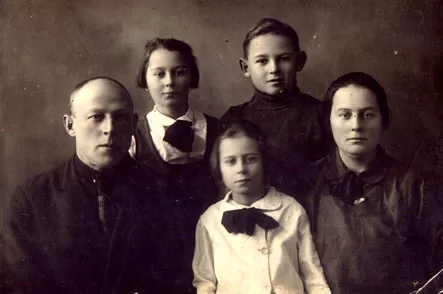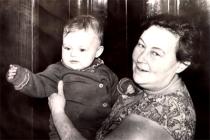Our family, the Shylmans. From left to right: my father Duvid Shylman, I, Surah-Leya Shylman, my sister Golda Shylman, my brother Boris Shylman, my mother Ghitlia Shylman. We were photographed to send this photo to father's sister Leika in Ostrozhok. Photo shop in Krasnoarmeyskaya Street, Kiev, 1930.
In summer 1919 my older brother Boris Shylman was born. I was was born on 13 March 1921 and my sister Golda Shylman was born on 23 January 1923. We spoke Yiddish at home. My mother knitted stockings on a stocking machine that had probably 1000 needles. She sold stockings at the market.
Later my father went to work as a clerk at a plant, I don't know how he managed to get this job, but I think that maybe his proletarian roots and that he could write and read played a decisive road. The plant constructed an apartment house for its employees and my father received a three-bedroom apartment in the center of Kiev not far from the plant. We lived in a two-storied house: there was a ground floor and we lived on the first floor. There was a table covered with a big tablecloth with fringe in the middle of the room and four chairs round the table. I remember how we sat at this table on Jewish holidays. My father was very religious then. At Pesach my mother took fancy crockery from an entresol. She covered the table with a white tablecloth and put delicious food on it. My father sat at the head of the table and we had seder. I loved Purim. It coincided with my birthday on 13 March. I remember my father turning a chicken over the head at Yom Kippur. This is all I remember. I was too young and cannot remember any details. I don't know what influenced my father, perhaps, this happened due to general historical tendencies when many young people, particularly workers at plants and factories, got overwhelmed with revolutionary ideas. In 1925 he became a communist and we stopped celebrating Jewish holidays at home. We began to celebrate Soviet holidays: 1 May, October revolution Day.
I went to a kindergarten as a child. It was difficult to get into a kindergarten in those years. Since I had bronchial asthma and needed special food they sent me to a kindergarten as an ill child. My sister and brother got no opportunity to get permission to go to the kindergarten. It was a Jewish kindergarten. I was too small and my brother and sister and other children from our yard took me to the kindergarten. We spoke Yiddish, sang Jewish songs, and recited Jewish poems in this kindergarten.
After the kindergarten I went to a Jewish lower secondary school. It was a policy then that children were to study in their national schools. Admission to my school required that I passed an interview. I knew Yiddish and my admission was positively resolved. When it was time for Olia to go to school she went to the interview in the Jewish school and said there in Yiddish 'I don't speak Yiddish'. She had Russian friends in the yard and didn't want to go to the Jewish school, but they admitted her anyway. My brother Boris studied in a Ukrainian school. That order about national schools was issued after he went to school. He finished his school in 1936 and entered Kiev Polytechnic College.















